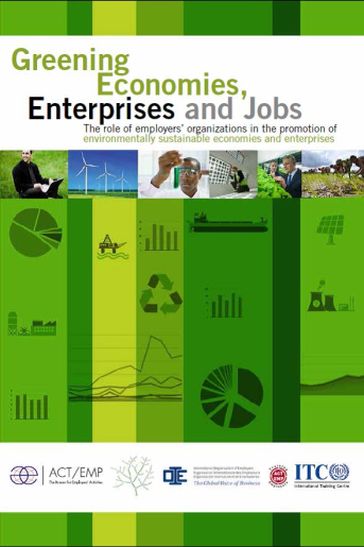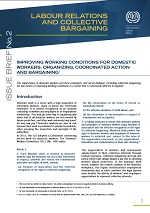Tools and Services on Forced Labour
2016
-
Conditions of Work and Employment Series No. 59
The (missing) link between wages and productivity in the Philippines: What role for collective bargaining and the new two-tier wage system?
07 October 2016
-

Issue Brief no. 4 - Labour Relations and Collective Bargaining
Negotiating for gender equality
27 September 2016
Inequality of opportunity, treatment and outcomes between women and men still persists in global labour markets. Achieving gender equality in the workplace remains one of the biggest challenges for governments, social partners and management at enterprise level. Gender-based discrimination often occurs at the recruitment stage on grounds of pregnancy, or potential child bearing and rearing and the gender pay gap remains high across the world. In addition, women are more likely to be affected by violence at work, whether physical, psychological or sexual. This Issue Brief focuses on the obstacles to gender equality at work and how collective bargaining can be used as an effective tool to overcome these challenges.
-
ILO Research paper No. 14
Global Supply Chain Dynamics and Labour Governance: Implications for Social Upgrading
13 May 2016
This paper examines how the emergence and change of the fragmented cross-national production system affects social upgrading in developing countries, focusing on the impact of private governance on labour conditions and workers’ rights. It also discusses the role of private voluntary standards in governing labour relations in GSCs, and their limitations and tensions with buyers’ purchasing practices.
-
Conditions of Work and Employment Series No. 73
Productivity, wages and unions in Japan
31 March 2016
-

Publication
Greening Economies, Enterprises and Jobs: The role of employers’ organizations in the promotion of environmentally sustainable economies and enterprises
15 March 2016
This resource guide provides an overview on: the evolving contribution of business to the sustainable development debate; planetary boundaries, environmental challenges and their implications for business; the greening of enterprises and workplaces, and; the role that business and employers’ organizations can play in lobbying and service development in the environmental field.
2015
-
Publication
Non-standard working in public services in Germany and the United Kingdom
19 December 2015
This paper is focused on those employed in the central civil service and those employed in local and regional government in Germany and the UK.
-
Publication
Unacceptable Forms of Work : Results of a Delphi Survey
16 December 2015
The objective of this Delphi study was to explore and find consensus among diverse stakeholders on potential dimensions and descriptors of UFW; this, in turn, would serve as a framework to identify what measures could be undertaken to enable transition from working conditions that are unacceptable, to conditions that allow workers to work and live in dignity.
-
Publication
Unacceptable Forms of Work : A global and comparative study
14 December 2015
Unacceptable forms of work (UFW) have been identified by the International Labour Organization (ILO) as work in conditions that deny fundamental principles and rights at work, put at risk the lives, health, freedom, human dignity and security of workers or keep households in conditions of poverty.The report takes as the central purpose of identifying UFW to devise targeted social and economic policies that aim to eliminate or transform jobs that are entirely unacceptable
-

A policy guide
Collective bargaining - a policy guide
11 December 2015
How can governments advance the effective recognition of this fundamental right? Which policies and institutions promote collective bargaining and how might they be established?
-

Issue Brief no. 2 - Labour Relations and Collective Bargaining
Improving working conditions for domestic workers: organizing, coordinated action and bargaining
04 December 2015
This Issue Brief examines innovative approaches to workers’ and employers’ organizations and collective bargaining that protect domestic workers from the risk of being engaged in unacceptable forms of work and afford them effective and inclusive labour protection.